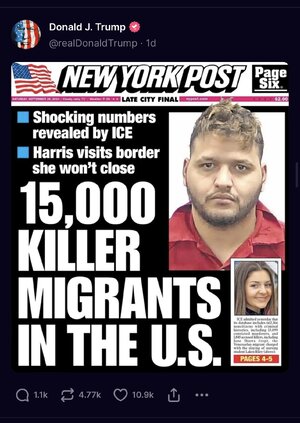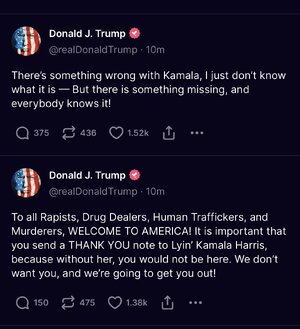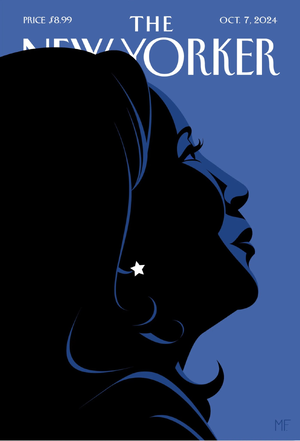Navigation
Install the app
How to install the app on iOS
Follow along with the video below to see how to install our site as a web app on your home screen.
Note: This feature may not be available in some browsers.
More options
You are using an out of date browser. It may not display this or other websites correctly.
You should upgrade or use an alternative browser.
You should upgrade or use an alternative browser.
2024 Presidential Election | ELECTION DAY 2024
- Thread starter nycfan
- Start date
- Replies: 8K
- Views: 332K
- Politics
- Messages
- 2,020
I know this has been said before but I feel like Trump is getting worse. I do think the desperation is going to lead to some pretty outlandish things, even for him.
quakerdevil
Distinguished Member
- Messages
- 346
I know this has been said before but I feel like Trump is getting worse. I do think the desperation is going to lead to some pretty outlandish things, even for him.
I don't remember which YouTube channel it was, but they put together a compilation of Trump in the 2016 debates versus 2024. The difference is stark.
- Messages
- 2,080
If Donald J. Trump loses the upcoming election, then he will spend the rest of his life in prison. The prospect of that tends to make most grifters pretty desperate. It's not like it was a long path to insanity for TrumpI know this has been said before but I feel like Trump is getting worse. I do think the desperation is going to lead to some pretty outlandish things, even for him.
JCTarheel82
Iconic Member
- Messages
- 2,489
Frightening to think that he'll likely continue to escalate the racist, xenophobic, nativist speech as the election draws closer. His rhetoric over the past couple months would make Goebbels blush.I know this has been said before but I feel like Trump is getting worse. I do think the desperation is going to lead to some pretty outlandish things, even for him.
EhringhausSouth
Distinguished Member
- Messages
- 279
I don't fret, Trump isn't winning. Harris will win with a map similar to Biden's 2020 win. best thing is for Trump to exit the political scene. Unfortunately, McConnell didn't play the long game. Best thing they could have done was remove Trump, let Pence finish the last few weeks and be rid of him. Piss poor job by the Republican leadership.
lightbluenc
Honored Member
- Messages
- 820
Good thing you are showing leadership and helping to get rid of trump by voting for Harris.I don't fret, Trump isn't winning. Harris will win with a map similar to Biden's 2020 win. best thing is for Trump to exit the political scene. Unfortunately, McConnell didn't play the long game. Best thing they could have done was remove Trump, let Pence finish the last few weeks and be rid of him. Piss poor job by the Republican leadership.
- Messages
- 4,013
every thing old is new againLike I said in another thread, it’s George Wallace like just without the n-word, yet.
and for you youngsters keep in mind that Wallace was a 3rd party candidate without right wing propaganda machines like Fox News.
He carried 5 states and finished 2nd in several other states and received 14% of the vote.
Just imagine if Wallace of 1968 ran today as the GQP candidate...
Last edited:
lawtig02
Legend of ZZL
- Messages
- 5,846
This is fantastic!
On an unrelated note, anyone have Franklin Graham’s email address handy?
EhringhausSouth
Distinguished Member
- Messages
- 279
Good thing you are showing leadership and helping to get rid of trump by voting for Harris.
I am voting against Trump but not for Harris.
So, you really aren’t trying to get rid of Trump.I am voting against Trump but not for Harris.
EhringhausSouth
Distinguished Member
- Messages
- 279
So, you really aren’t trying to get rid of Trump.
Yes I am, I am voting against him. I want him off the political scene. But at the same time, don't want Harris on it. I'm voting against both in the Presidential Race. I have decided to vote for Stein for Governor and a variety of other Democratic candidates in NC.
- Messages
- 40,761
Good deal. Please accept my plug for Jeff Jackson for AG. And for the love of God, vote against Michelle Morrow.Yes I am, I am voting against him. I want him off the political scene. But at the same time, don't want Harris on it. I'm voting against both in the Presidential Race. I have decided to vote for Stein for Governor and a variety of other Democratic candidates in NC.
EhringhausSouth
Distinguished Member
- Messages
- 279
Good deal. Please accept my plug for Jeff Jackson for AG. And for the love of God, vote against Michelle Morrow.
As a public school teacher, Mo has got my vote.
UNCBAdookJD
Esteemed Member
- Messages
- 583
That’s dumb, because Stein will not win. Signed, a Gary Johnson 2016 voter who was a disillusioned Republican who believed all the 538 projections saying Hillary was going to win, thinking I was sending a message that she wouldn’t have a mandate.Yes I am, I am voting against him. I want him off the political scene. But at the same time, don't want Harris on it. I'm voting against both in the Presidential Race. I have decided to vote for Stein for Governor and a variety of other Democratic candidates in NC.
Share:



